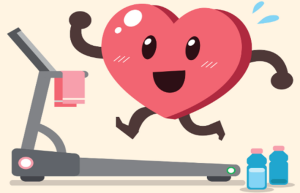This week is Australia’s national Heart Health Week. This campaign is held the first week of May each year, its aim is to raise awareness around the importance of having a healthy heart. It provides an opportunity for both health professionals and the Australian public to start a conversation about heart health. Heart disease is the leading cause of death in Australia, with 48,000 deaths per year, that equates to one Australian passing away from heart disease every 12 minutes.
The heart is our bodies hardest working organ, beating non-stop pumping blood to every part of bodies 24hours per day, therefore it is essential we take care of it! Several studies have shown that people who exercise regularly are less likely to have a sudden heart attack or suffer from another life-threatening cardiac event. Most of us know the things we should avoid when it comes to heart health, like avoiding smoking and having an unhealthy diet, but how many people know the things we should be doing to optimise our heart health?
It is well-know that exercise is good for our bodies, this is because exercise helps to protect our heart and blood vessels, it boosts our immune system, and helps to keep us fit and strong. One key benefit of exercise is that it helps to control or modify risk factors of heart disease such as, weight, improved conduction of the heart muscles, reduces stress hormones and lowers blood pressure.
Exercise for the heart:
The American Heart Association and the American College of Sports Medicine both recommend a combination of aerobic and moderate resistance training as the most effective exercise to improve heart health and preventing heart disease. Aerobic exercise could include exercise such as jogging, swimming, walking, or biking, whereas moderate intensity resistance training could include light weights, or resistance band exercises.
How often and how much exercise?
The Australian Department of Health guidelines recommend the following when exercising for heart health between the ages of 18-64 years old:
- Doing any physical activity is better than doing none. Start by doing some and gradually build up to the recommended amount. Be active most, preferably all, days of the week.
- Work towards accumulating 150-300 minutes (2 ½ to 5 hours) of moderate intensity physical activity or 75 to 150 minutes (1 ¼ to 2 ½ hours) of vigorous physical activity each week.
- Work towards muscle strengthening or resistance training exercises at least 2 days per week.
Rest and Sleep:
Rest and sleep are two crucial functions that our bodies need for optimal heart health and wellbeing. A lack of sleep has been linked to a range of conditions such as heart disease, high blood pressure or diabetes.
Getting between seven and eight hours of good sleep per night contributes to regulating blood pressure, reducing stress levels, reduces risk factors associated with heart disease and helps to boost your emotions, social interactions all while improving your immune system.
Conclusion:
We now understand that exercise is essential for heart health as it helps to lower our blood pressure, reduces our risk of cardiovascular disease, reduces the likelihood of a sudden cardiac, like a heart attack. Exercise helps to build our heart muscles making them string in turn improving heart conduction.
Whether you are young or old, it is always the right time to prioritize your heart health. Start now by booking a heart heath check with your GP or an appointment with your local Exercise Physiologist to help you start your exercise journey.




